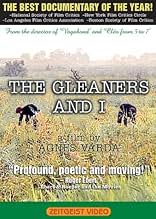Le interviste di Varda spigolano in Francia in tutte le forme, da quelli che raccolgono i campi dopo il raccolto a quelli che setacciano i cassonetti di Parigi.Le interviste di Varda spigolano in Francia in tutte le forme, da quelli che raccolgono i campi dopo il raccolto a quelli che setacciano i cassonetti di Parigi.Le interviste di Varda spigolano in Francia in tutte le forme, da quelli che raccolgono i campi dopo il raccolto a quelli che setacciano i cassonetti di Parigi.






















